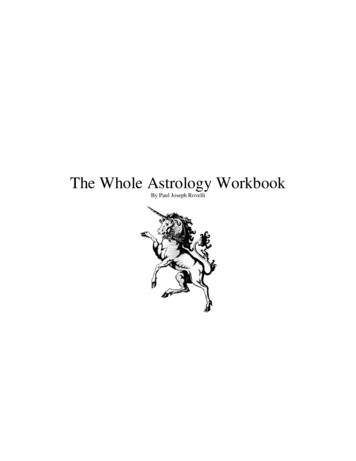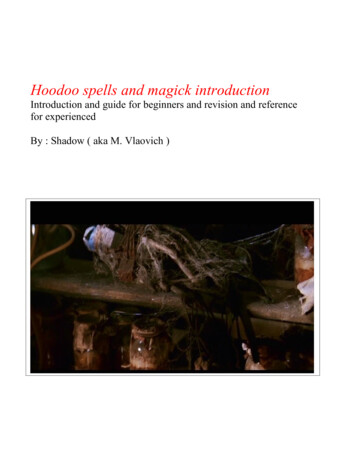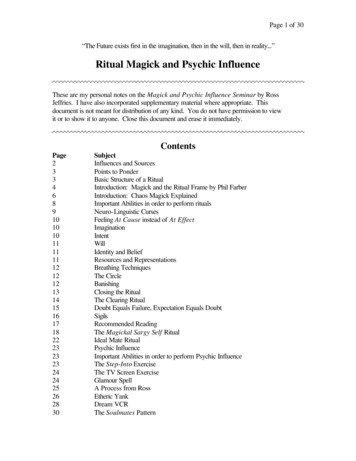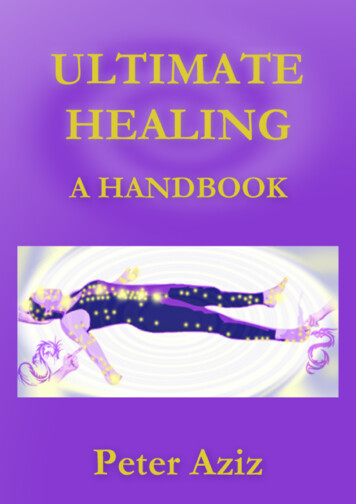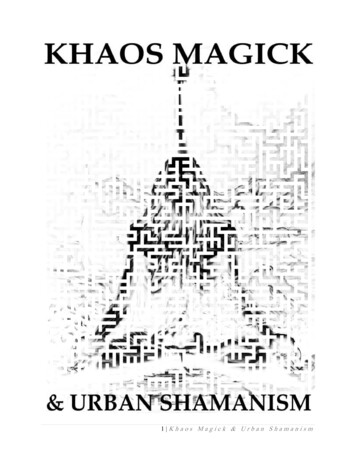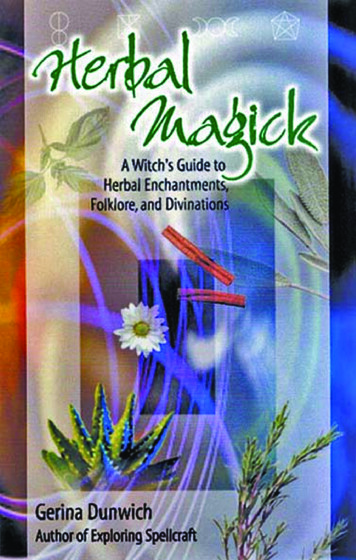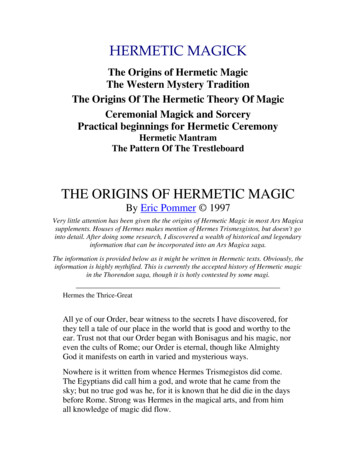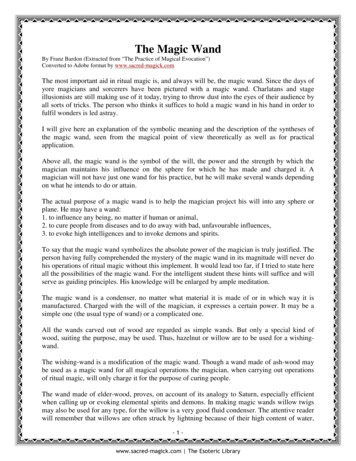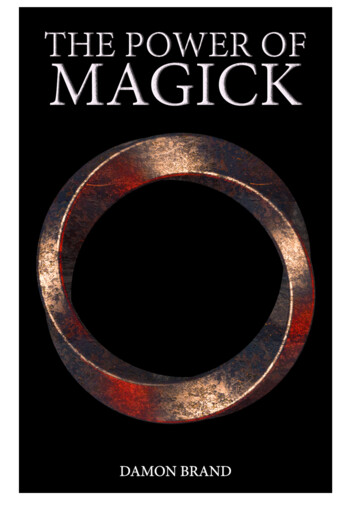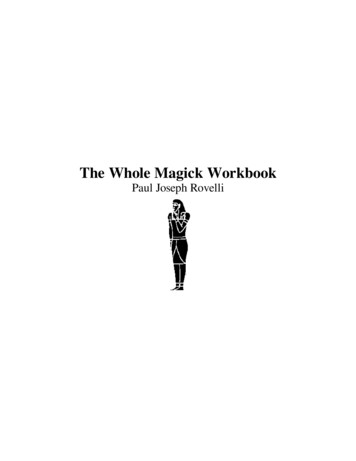
Transcription
The Whole Magick WorkbookPaul Joseph Rovelli
Table of ContentsPrefaceThe Formation of a Magickal UniverseIntroductionQabalah and MagickPreambleThe Magick DiaryChapter 1Construction of the Magickal CircleChapter 2The Magickal TempleChapter 3The Magickal CeremonyChapter 4MeditationChapter 5InitiationChapter 6The Magickal UniverseChapter 7Invocation
Chapter 8Evocation & the Manufactureof Amulets & TalismansChapter 9The EucharistChapter 10The Holy Guardian AngelAPPENDICESAppendix 1Seven Hermetic PrinciplesAppendix 2The Emerald Tabletof Hermes TrismegistusAppendix 3The Divine Pymanderof Hermes Trismegistus
-PrefaceThe Formation of a Magickal UniverseAll effective Magick stands on three basic skills: imagination, emotion, and intuition. Theinvocations and gestures, implements and costumes, circles, triangles and furniture, indeed allthe elements of a temple-based rite serve only to reinforce and focus these three capacities. Ofcourse, the mental skills developed in the construction and consecration of the ElementalWeapons is a precursor to these skills. Here, the mental capacities of the Aspirant are tunedand strengthened so that any success whatsoever might be possible.Of the three, Emotion to the point of passion and under the influence of the higher will or HolyGuardian Angel is the most vital skill. Even first, that emotion should be towards the attainmentof the Knowledge & Conversation of this Holy Guardian Angel or Higher & Perfected Self. Suchan holy passion is found in the uninhibited coupling with that force with which you are seekingto invoke. Thus does this passion become aroused to the point that the connection suffers fromno restrictions or hesitations for the union. In this way there is a sense of a boundlessenthusiasm for the work. This is covered quite well in Crowley's article: 'Energized Enthusiasm'.In much of the Magick of the previous aeon, this is spoken in a context with definite religiousovertones as this has stirred the soul of humanity with extreme fervor. Of course, the “awe andfear of the Creator” is supplanted by the Holy Guardian Angel in Thelemic Magick. Yet in theoriginal context, the religious aspects serve as the motivation behind doing the work; they are apromise, acceptable to the mind of a medieval man, that the whole effort is holy. In Thelemicterms, the Angel guarantees that such an act is in accord with the Will.This passion then comes from a desire for engagement with something that fulfills a part ofone's own nature as it satisfies its needs or gives it an outlet for full expression. It is sanctionedby the Holy Guardian Angel or for the Aspirant, by the potency of one's Neschamah as he or shestrives to contact the Angel. Of course, for the latter, the only connection that one should beattempting to foster is that with the Angel itself. Until that is achieved, no certain good cancome from any magickal effort.Imagination provides the medium through which Magick produces its results. The personalimagination forms the Astral Light, described by Eliphas Levi as the medium of the Etheric plane.The symbols used in Magick are forms that, when created in the imagination, tend to gatherspecific types of power from the Astral Light which are manipulated by the intent of theOperator. This is so due to the potency of the Thelemic egregore as an established force. Thesimpler, geometric forms such as the pentagram and hexagram, draw relatively pure,fundamental forces such as elemental and planetary forces. More complex symbols such asEgyptian god-forms, draw correspondingly, more complex assemblages of forces.An object that begins as a purely internal construct created and sustained by the willedimagination of the Operator, can move out into the Astral Light and take on a life independentof its creator. It can gather or become a container for magickal power, and act back on itscreator or on others in ways that are impossible for one to produce through his or herimagination alone. This is the basis for the theories on Magickal Attack and Talismanic Magick
as it pertains to the nature and nurture of the Magickal Link. And again, I stress for the Aspirantthat one must first produce the link with the Angel before any of the other possible workingscan be worked with safety and certainty.Additionally, beings and powers operating on levels the Operator cannot yet perceive can makethemselves known to him or her through the receptive nature of the imagination; opening his orher awareness into new realms of experience. When the Operator projects the image of asymbol onto his or her surroundings, an extended Sacred Space is created in which the AstralLight becomes conditioned into conformity with the symbol. The area becomes more attractiveto the types of power invoked, more comfortable for magickal beings having the naturerepresented by the symbol. The world of the powers and the world of the Operator thenintersect, making interaction possible. Of course, a skeptical discernment and proving ofauthenticity requires the adroitness of the Magickal skills of the operator; most particularly, thesanction of the Angel.Intuition is the confirmation of a successful Magickal rite. In order to bring about the desiredresults, one must ultimately arouse the sensations and feelings that the symbols created in theimagination are real; acting as if the goal of the operation has already been accomplished. Hereis where the Angel becomes directly involved as it proffers its assurance of success. This feelingof reality is the trigger that causes a symbol to move from the imagination into the Astral Light.This is the sanction of the Angel and is a strong intuition which is concurrently a communicationfrom the Angel.The full development of this communication makes one in the words of Carlos Casteneda, a‘Man of Knowledge'. At first, this communication will be tenuous as the Aspirant will not beclear about the communication from the Angel, as the Aspirant is not clear about his or herobjective in the pursuit of the Aspiration. His or her purpose may actually be based on rathervulgar desires; not clearly expressed. He or she may be suddenly surprised and disillusionedwhen confronted with the hardships of learning to communicate with the Angel.As once one enters on this path, one must inevitably arrive at the end thereof, he or she slowlybegins to learn; slowly at first, and then at a greater rapidity as the inspiration that is the byproduct of this intuitive spark increases. Now a much more mature conception of his or herAspiration becomes apparent; this coming almost as a surprise. And his or her new intuitions(communications from the Angel) will soon clash with the old desires. This brings one to thegate of fear and awe where the cry of the Angel is for courage with the Aspirant deep at warwith his or herself.This is the first test of the Aspirant on the journey towards Initiation. The call is for the Aspirantto defy his or her fear by responding with courageous persistence in his pursuit of the fullKnowledge & Conversation with the Angel. Eventually, the Aspirant begins to adapt to thispsychic situation and the intuitions from the Angel are assimilated into his or her everydayconsciousness.The Aspirant now has learned how to relate to his or her desires and to subject them to theclearer scrutiny of the Intuition. In so doing, the Aspirant becomes the master of these desiresand can respond to them with a strong impeccability as a sharp clarity encompasses the natureof his or her consciousness. Yet this new development comes with its own more subtle test.
That clarity of mind which comes from the successful mastery of this intuitive process maydispel the fear that was so integral to the onset of this Initiatory experience, but it will alsobecome quite blinding. It can induce the Aspirant an overconfident as he or she will lose all selfdoubt.This is a trance that is as much real as it is an illusion. The Aspirant is warned to master thisclarity with a certain humility. If he or she fails at this point; believing this to be the successfulcompletion of the Aspirant's Initiation, then this arrogance will occlude any furtherdevelopment. The Aspirant will rush when he or she should be patient, or the Aspirant will bepatient when he or she should rush. Indeed, the Aspirant will fumble with learning until he orshe winds up incapable of learning anything more. The Clarity of consciousness will remain todelude one with the idea of his or her successful completion of the Initiatic journey towardsAdepthood. But actually, the Aspirant will no longer learn, or yearn for anything.To continue learning, the Aspirant must defy his or her clarity and use it only to 'see', and waitpatiently (lurk as a warrior) in order to measure all situations very carefully before taking newsteps; approaching this clarity of consciousness in a scientifically skeptical manner. And amoment will come when the Aspirant will understand that this clarity is but a veil to a moresubtle level of consciousness that is much more intimately entwined with the voice of his or herAngel. The Aspirant will then arrive at a position where nothing can interfere with thiscommunication. Thus will he or she have attained Adeptship; true Magickal power.The new Adept will know at this point that the power he or she has been pursuing for so long isfinally attained. The Adept's Angel has become his or her ally and an unmistakable feeling ofinvincibility overtakes him or her. Yet the Great Work has only just begun and the danger offailure is even greater. The tendency here, is to surrender to this power and be wielded by itrather than mastering it. In this trance, the Adept becomes intolerant of the Will of others asher or she becomes cruel and capricious. As such, this power becomes a burden upon his or herfate. Such an Adept has no command over him or herself, and cannot tell when or how to usehis power. Such is the fate of the dupe of the Black Lodge.In order to overcome this occlusion, the Adept must then defy this power as he or she mustunderstand that this never truly belonged to him or her to begin with. The Adept must keephim or herself in line at all times, handling carefully and faithfully, all that he or she has learned.The Adept must understant that clarity and power, without this control over him or herself, areworse than mistakes. He or she will then reach a point where everything is held in check andthe Adept will then know when and how to use his power; becoming a true Master.
-IntroductionQabalah and MagickThe Qabalah used in Thelemic Magick was originally developed from the Rabbinical tradition ofthe Hebrews. From this, was fashioned by our Medieval and Renaissance era forebears, what isnow known as the Hermetic Qabalah as finally canonized by the Golden Dawn of MacGregorMathers. Elements of a Greek Qabalah and even other spiritual systems were incorporated intowhat is a truly syncretic construct. But what remains essentially important is the two basic andcomplete systems of the Rabbinical and Hermetic traditions. These two need to be examinedand compared with each other.The Rabbinical Qabalah is comprised of two separate systems; that of the Sefer Yetzirah andthat of the Sefer ha Zohar. The Yetziratic system focuses on the Hebrew language as the vehicleby which the Cosmos is quantified into a symbolic structure, mapped and utilized to explorelevels of consciousness as revealed in physical and meta-physical dimensions. The Zoharicsystem conversely, bases itself on the text of the Torah, and investigates the synchronisticconnections that further elaborate the principles expounded in it by the divinity from which itwas communicated to the human race.The Rabbins eventually gave greater precedence to the Zoharic system; utilizing the Yetziraticsystem as a secondary support serving only to further illuminate the Zoharic teaching. HermeticQabalah would take the reverse, utilizing the Yetziratic teaching as the primary map and theZoharic would then support this with supplemental information from which to construct it'sdogmas. This was particularly necessary as the Torah was no longer the sole source of divinerevelation. Therefore, the Zoharic methods could be applied to a variety of Christian texts andother sacred texts outside the Judeo-Christian tradition. The Yetziratic system would becomethe one unifying factor amongst all these diverse traditions.What is common to both the Yetziratic and Zoharic systems is the primary concern with divinerevelation and the language in which that revelation is communicated. They are used to morethoroughly examine the nature and character of the divinity as it has presented itself. Becausethis language was found by the deity to be suitable as a vehicle of self-expression and theunfolding of its complex, omnipresent nature, it is then determined to have a special status as aholy tongue that speaks on many different levels simultaneously. These cannot be directlyapproached through the linear nature of casual reading, as there are higher spiritual levelswithin the text being invisible to the naked eye as is the deity itself. A special insight, employingthe reliance on synchronistic omens and symbols found within the text parallels what mostother civilizations often found in observing the processes of nature.For a Thelemic Qabalah to be authentic, we must therefore then first note that we must followand develop the Hebrew model by justifying the use of English as a "Holy Tongue" as we notethat the Jews have the half as declared in Liber AL vel Legis. The Master Therion was verycareful in his Qabalistic examination of Aiwass or Aiwaz as a praeter-human or divineintelligence transmitting a new covenant to humanity. And the synchronistic correspondencesof the text along with the unfolding of its prophecies further validates both the communicating
intelligence and his transmission as divinely inspired. The text is then categorized a
fear of the reator” is supplanted by the Holy Guardian Angel in Thelemic Magick. Yet in the original context, the religious aspects serve as the motivation behind doing the work; they are a promise, acceptable to the mind of a medieval man, that the whole effort is holy. In Thelemic terms, the Angel guarantees that such an act is in accord with the Will. This passion then comes from a desire .


